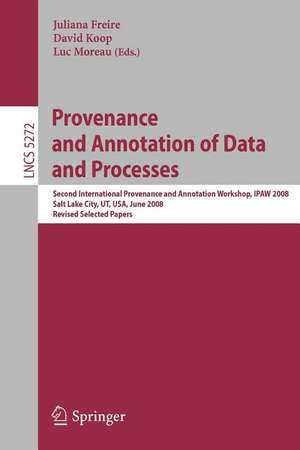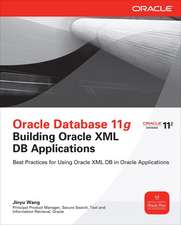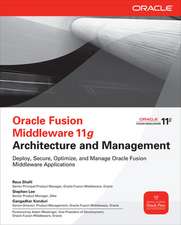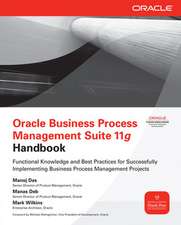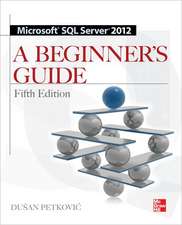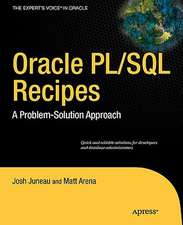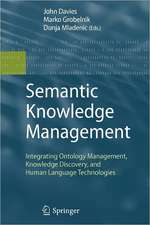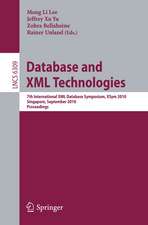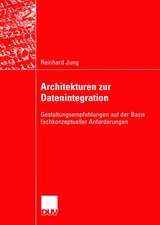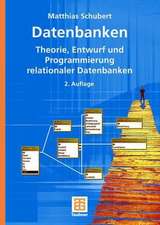Provenance and Annotation of Data and Processes: Second International Provenance and Annotation Workshop, IPAW 2008, Salt Lake City, UT, USA, June 17-18, 2008: Lecture Notes in Computer Science, cartea 5272
Editat de Juliana Freire, David Koopen Limba Engleză Paperback – 2 dec 2008
Din seria Lecture Notes in Computer Science
- 20%
 Preț: 1061.55 lei
Preț: 1061.55 lei - 20%
 Preț: 307.71 lei
Preț: 307.71 lei - 20%
 Preț: 438.69 lei
Preț: 438.69 lei - 20%
 Preț: 579.30 lei
Preț: 579.30 lei -
 Preț: 410.88 lei
Preț: 410.88 lei - 17%
 Preț: 427.22 lei
Preț: 427.22 lei - 20%
 Preț: 596.46 lei
Preț: 596.46 lei - 15%
 Preț: 448.04 lei
Preț: 448.04 lei - 20%
 Preț: 353.50 lei
Preț: 353.50 lei -
 Preț: 389.49 lei
Preț: 389.49 lei - 20%
 Preț: 309.90 lei
Preț: 309.90 lei - 20%
 Preț: 645.28 lei
Preț: 645.28 lei - 20%
 Preț: 763.23 lei
Preț: 763.23 lei - 15%
 Preț: 580.46 lei
Preț: 580.46 lei - 20%
 Preț: 310.28 lei
Preț: 310.28 lei - 20%
 Preț: 655.02 lei
Preț: 655.02 lei - 20%
 Preț: 1183.14 lei
Preț: 1183.14 lei - 20%
 Preț: 340.32 lei
Preț: 340.32 lei -
 Preț: 449.57 lei
Preț: 449.57 lei - 20%
 Preț: 591.51 lei
Preț: 591.51 lei - 18%
 Preț: 938.83 lei
Preț: 938.83 lei - 20%
 Preț: 337.00 lei
Preț: 337.00 lei - 20%
 Preț: 649.50 lei
Preț: 649.50 lei - 20%
 Preț: 607.40 lei
Preț: 607.40 lei - 20%
 Preț: 1414.79 lei
Preț: 1414.79 lei - 20%
 Preț: 1024.44 lei
Preț: 1024.44 lei - 20%
 Preț: 583.40 lei
Preț: 583.40 lei - 20%
 Preț: 453.32 lei
Preț: 453.32 lei - 20%
 Preț: 575.49 lei
Preț: 575.49 lei - 20%
 Preț: 1075.26 lei
Preț: 1075.26 lei - 20%
 Preț: 585.88 lei
Preț: 585.88 lei - 20%
 Preț: 825.93 lei
Preț: 825.93 lei - 17%
 Preț: 360.20 lei
Preț: 360.20 lei - 20%
 Preț: 763.23 lei
Preț: 763.23 lei - 20%
 Preț: 340.32 lei
Preț: 340.32 lei - 20%
 Preț: 504.58 lei
Preț: 504.58 lei - 20%
 Preț: 369.13 lei
Preț: 369.13 lei - 20%
 Preț: 580.93 lei
Preț: 580.93 lei - 20%
 Preț: 343.62 lei
Preț: 343.62 lei - 20%
 Preț: 350.21 lei
Preț: 350.21 lei - 20%
 Preț: 583.40 lei
Preț: 583.40 lei - 20%
 Preț: 583.40 lei
Preț: 583.40 lei - 15%
 Preț: 438.59 lei
Preț: 438.59 lei - 20%
 Preț: 341.95 lei
Preț: 341.95 lei - 20%
 Preț: 238.01 lei
Preț: 238.01 lei - 20%
 Preț: 538.30 lei
Preț: 538.30 lei
Preț: 335.36 lei
Preț vechi: 419.20 lei
-20% Nou
Puncte Express: 503
Preț estimativ în valută:
64.18€ • 66.76$ • 52.98£
64.18€ • 66.76$ • 52.98£
Carte tipărită la comandă
Livrare economică 15-29 aprilie
Preluare comenzi: 021 569.72.76
Specificații
ISBN-13: 9783540899648
ISBN-10: 3540899642
Pagini: 344
Ilustrații: XI, 328 p.
Dimensiuni: 155 x 235 x 23 mm
Greutate: 0.5 kg
Ediția:2008
Editura: Springer Berlin, Heidelberg
Colecția Springer
Seriile Lecture Notes in Computer Science, Information Systems and Applications, incl. Internet/Web, and HCI
Locul publicării:Berlin, Heidelberg, Germany
ISBN-10: 3540899642
Pagini: 344
Ilustrații: XI, 328 p.
Dimensiuni: 155 x 235 x 23 mm
Greutate: 0.5 kg
Ediția:2008
Editura: Springer Berlin, Heidelberg
Colecția Springer
Seriile Lecture Notes in Computer Science, Information Systems and Applications, incl. Internet/Web, and HCI
Locul publicării:Berlin, Heidelberg, Germany
Public țintă
ResearchCuprins
Keynotes.- Provenance for Database Transformations.- Enforcing the Scientific Method.- Papers.- Mapping the NRC Dataflow Model to the Open Provenance Model.- Data Lineage Model for Taverna Workflows with Lightweight Annotation Requirements.- A Logic Programming Approach to Scientific Workflow Provenance Querying.- Recording the Context of Action for Process Documentation.- User-Centric Annotation Management for Biological Data.- A Model for Sharing of Confidential Provenance Information in a Query Based System.- Kepler/pPOD: Scientific Workflow and Provenance Support for Assembling the Tree of Life.- Using Visualization Process Graphs to Improve Visualization Exploration.- Implementation and Evaluation of a Protocol for Recording Process Documentation in the Presence of Failures.- Provenance and the Price of Identity.- Towards Provenance-Enabling ParaView.- Application of Provenance for Automated and Research Driven Workflows.- Using Provenance to Improve Workflow Design.- Job Provenance – Insight into Very Large Provenance Datasets.- A Provenance-Based Fault Tolerance Mechanism for Scientific Workflows.- A First Study on Clustering Collections of Workflow Graphs.- Exploiting Provenance to Make Sense of Automated Decisions in Scientific Workflows.- Using Explicit Control Processes in Distributed Workflows to Gather Provenance.- ES3: A Demonstration of Transparent Provenance for Scientific Computation.- Neuroimaging Data Provenance Using the LONI Pipeline Workflow Environment.- Provenance Tracking in an Earth Science Data Processing System.- A Python Library for Provenance Recording and Querying.- Requirements for a Provenance Visualization Component.- Advances and Challenges for Scalable Provenance in Stream Processing Systems.- Using Provenance to Support Real-TimeCollaborative Design of Workflows.- Provenance in Sensornet Republishing.- Semantically-Enhanced Model-Experiment-Evaluation Processes (SeMEEPs) within the Atmospheric Chemistry Community.- Oceanographic Data Provenance Tracking with the Shore Side Data System.- Invited Contribution.- The Open Provenance Model: An Overview.
Textul de pe ultima copertă
This book constitutes the thoroughly refereed post-conference proceedings of the Second International Provenance and Annotation Workshop, IPAW 2008, held in Salt Lake City, UT, USA, in June 2007.
The 14 revised full papers and 15 revised short and demo papers presented together with 2 keynote lectures were carefully reviewed and selected from 40 submissions. The paper are organized in topical sections on provenance: models and querying; provenance: visualization, failures, identity; provenance and workflows; provenance for streams and collaboration; and applications.
The 14 revised full papers and 15 revised short and demo papers presented together with 2 keynote lectures were carefully reviewed and selected from 40 submissions. The paper are organized in topical sections on provenance: models and querying; provenance: visualization, failures, identity; provenance and workflows; provenance for streams and collaboration; and applications.
